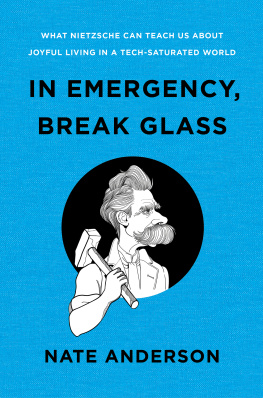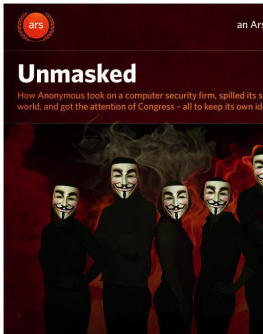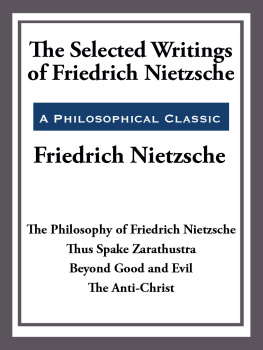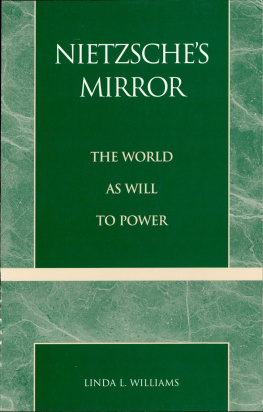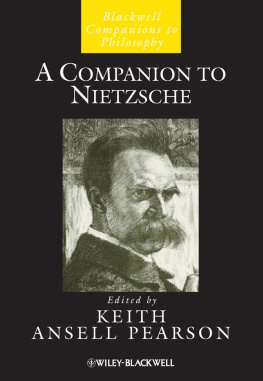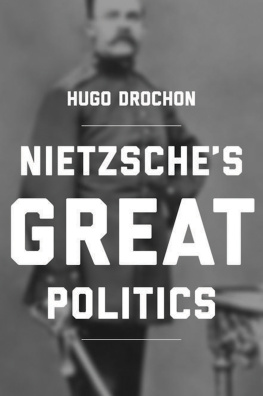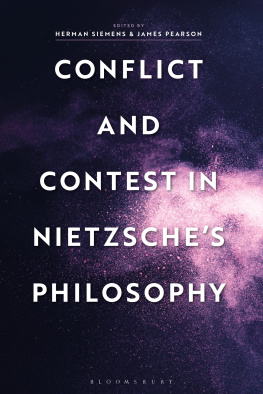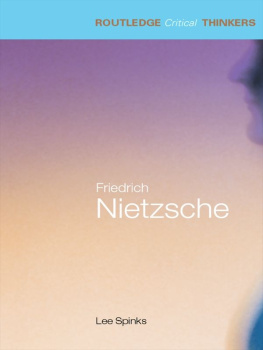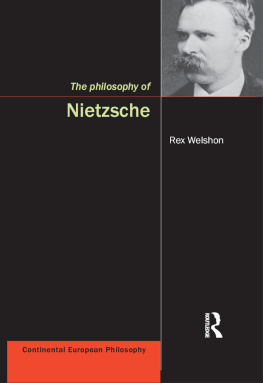
IN
EMERGENCY,
BREAK
GLASS
What Nietzsche Can Teach Us
About Joyful Living in
a Tech-Saturated World
Nate Anderson

W.W. NORTON & COMPANY
Independent Publishers Since 1923
ALSO BY NATE ANDERSON
The Internet Police: How Crime Went Online, and the Cops Followed
In
Emergency,
Break
Glass
For Gordon
The Tigers Eye
MY LIFE SHRANK SLOWLYUNTIL ONE DAY IT BECAME too small.
I used to feel that, in stitching me together, the Universe had rather gone out of its way. To know that my atomic makeup was forged in the furnaces of the primal starfield and that my childhood geography was shaped by glaciers dragging themselves north through Wisconsin for centurieswell, it all suggested a lot of effort. I felt a duty to make that work count, to change history for the better, to bestride the narrow world like a Colossusor, at least, to do more than watch epic amounts of television.
Under the influence of the 1980s band Survivor, I adopted the Eye of the Tiger. I would change the worldand Id enjoy doing it. Yet one day I woke to find that carpe diem! had been replaced by How many emails can I answer before noon?
It happened so gradually. When at last I noticed, I looked around with a shock to find that my life had taken on a certain indoor qualitycomfortable but quiet and air-conditioned. Perhaps it was just a case of becoming a realist with a mortgage, but it felt more deflating.
Technology did not cause this lifestyle contraction, but it served as means and enabler. I was the product of a revolutionin communication, media, and practically everything elsethat had driven us all indoors during the past century. Even in a friendly midwestern town of immaculate houses, I didnt meet my neighbor for 3 years. Our encounter required another intervention of the Universe: a freak blizzard that drew us all outside to clear several feet of snow from our driveways. My neighbor had until then existed for me as a head inside a Lexus, but he now burst forth in triumph from his garage astride the largest yellow snowblower I have ever seen. The winters disruption sparked some dormant sense of community, and my neighbor offered to clear my drive. But we spoke only for a moment; the snarl of the machine prevented further connection. I went back inside, pleased with the help but wondering if life might not be better had I shoveled alongside my neighbor, in amiable conversation, for an hour.
The Internet allowed me to write from home, and I made a fair living as a technology journalist whose commute could be as short as sitting up in bed to crack open the laptop. There was peace and freedom in this, and there was limitation. It required effort to make new friends; it required effort simply to escape the house. After a decade working from home, my days were spent before computers, my nights spent before televisions, and my free moments spent itching to unlock a tablet or mobile phone.
My grandparents had farmed the fertile fields of Iowa, slaughtered hogs, and sold Ethan Allen furniture. They lived into their nineties without ever watching more than Wheel of Fortune and the evening news. They had little need for screens, yet my life had become screens. Without them, I could no longer read the paper, write a letter, play a game, talk to friends, work a job, check the weather, make a to-do list, read a novel, listen to music, watch a movie, or take a photograph. The worlds tactile richness was reduced to polished pieces of glass.
Atoms, galaxiesthe Universe is ever restless. Yet there I was, day after comfortable day, sitting still. I sat on couches, beds, and chairs. Some days I mixed things up by moving from the couch in the basement to the couch in the living room or from the chair at my desk to the chair in my bedroom. I became a champion seat-sitter, a connoisseur of the sedentary, the kind of person with strong opinions about lumbar support and chair height. The gap between the raw activity of my grandparents life and my own tap-click existence had become a canyon.
While doing all that sitting, I lost the ability to say no to words. Each day I moved my eye across tens of thousands of themhundreds of emails, dozens of news articles, several long-form magazine pieces, a continuous stream of text chat from my colleagues. I was living what, as long ago as 2009, researchers at the University of CaliforniaSan Diego had described: Americans consumed information for about 1.3 trillion hours, an average of almost 12 hours per day, which corresponded to 100,500 words and 34 gigabytes for an average person on an average day. This seemed unbelievable, but not by much.
An alarming number of my dinner comments began with the phrase, I was just reading an article about that... As a former graduate student in English Lit, I felt terrible about this because my growing information inhalation coincided with an inability to get through books. Yet I had always loved books. My shelves buckled beneath the weight of P.G. Wodehouse, Graham Swift, and W.G. Sebald, yet much of the material I spent my time reading each day was two steps above a Buzzfeed Which Hogwarts house are you? quiz. Words had become a fire hose, blasting me constantly in the face. They were exhilarating but exhausting; when you need a drink, a single glass of clean water offers more refreshment.
At the end of a day spent among those 100,500 words, I felt incapable of sustained focus. My screens then offered their own remedy: an unending stream of video content. This came with costs, including an even stronger sense of information overload. In the bad old days, the live TV schedule had simply washed over me; I felt no responsibility for it. Now, watching a show was a matter of choice, and the completist in me had to watch every episode. I began to dread multi-season shows. Too much of a commitment! I thought. As soon as one show was complete, ten others jostled to take its place.
Still, sustained watching was easier than sustained reading, and I feasted like a vegetarian in a tofu factory. I streamed every episode of Lost and spent the next year telling my wife that anyone who wrote for the final three seasons should be banned from Hollywood. I binged on complete runs of Friends, Frasier, and 30 Rock (twice). I even watched Gordon Ramsay shout his way through four seasons of the reality show Hells Kitchen, an act for which I am still doing penance.
I wallowed in more material than I could work through in a dozen lifetimes: 40-hour video games, board-gaming podcasts, and Bob Dylan albums; iPad apps to try, Kindle books to read, and Epicurious recipes to bake; British murder-mystery TV shows, interactive New York Times explainers, audiobook versions of The Odyssey narrated by Ian McKellen. The new technologies of abundance stood ready to engage my attention anytime, anywhere, on any device.
But my attention, the searchlight of consciousness, also came under assault by new technologies of interruption: text messages, group chats, Slack messages, emails, and app notifications. It reached a point where I could go only minutes without something on my computer or mobile phone beeping, buzzing, or intruding itself. And I didnt turn any of this off, because it felt good to be given this succession of tiny gifts, each one a surprise. In a world where people checked their phones 80 times a dayor every 12 waking minutes, on averagethe simple act of focus became countercultural.
Looked at in one way, I was living the dream: My life demanded little physical exertion, it required no risks, and it piped endless information and amusement right to my eyeballs. It was, in that favorite word of Silicon Valley CEOs, frictionless.
Next page
